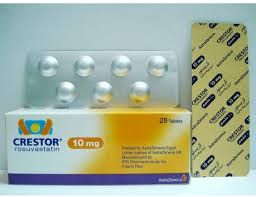Crestor (generic name: rosuvastatin) is a prescription medication belonging to the class of drugs known as HMG-CoA reductase inhibitors, commonly referred to as statins. It is primarily used to manage cholesterol levels and reduce the risk of cardiovascular diseases.
Key Uses
- Lowering LDL Cholesterol: Crestor effectively reduces levels of low-density lipoprotein (LDL), often referred to as "bad" cholesterol.
- Increasing HDL Cholesterol: It helps raise high-density lipoprotein (HDL) levels, known as "good" cholesterol.
- Reducing Triglycerides: The medication lowers triglyceride levels in the blood.
- Slowing Atherosclerosis: Crestor is used to slow the progression of atherosclerosis, which is the buildup of plaque in the arteries.
- Preventing Cardiovascular Events: It is indicated for adults at risk of heart attack or stroke due to existing risk factors, particularly in men over 50 and women over 60.
Dosage Information
- Strength: Each tablet contains 10 mg of rosuvastatin.
- Packaging: Typically available in packs containing 28 tablets.
- Administration: Taken orally, with or without food. It's important to follow the prescribed dosage by a healthcare provider.
Side Effects
Common side effects may include:
- Headache
- Muscle pain or weakness
- Nausea or abdominal pain
- Constipation
Serious side effects can include:
- Muscle problems (myopathy or rhabdomyolysis), which may present as unexplained muscle pain, tenderness, or weakness.
- Liver issues, indicated by symptoms such as dark urine, jaundice, and fatigue.
Patients are advised to report any severe side effects or unusual symptoms to their healthcare provider immediately.
Warnings and Precautions
- Liver Function Monitoring: Regular liver function tests may be required during treatment.
- Drug Interactions: Crestor can interact with other medications; it’s crucial to inform your doctor about all medications you are taking.
- Pregnancy and Breastfeeding: Not recommended during pregnancy or breastfeeding unless deemed necessary by a healthcare provider.



